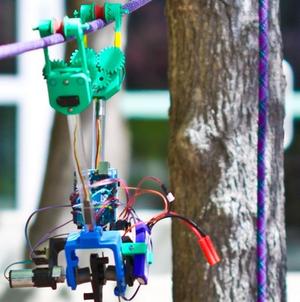GridRobot makes inspecting power lines simple, inexpensive
Mechanical engineers invented a robot designed to scoot along utility lines, searching for damage and other problems that require repairs. Made of off-the-shelf electronics and plastic parts printed on an inexpensive 3D printer, the SkySweeper prototype could be scaled up for less than $1,000, making it significantly more economical than the two models of robots currently used to inspect power lines.

SkySweeper, an inexpensive line inspection robot, during testing // Source: ucsd.edu
Mechanical engineers at the University of California, San Diego invented a robot designed to scoot along utility lines, searching for damage and other problems that require repairs. Made of off-the-shelf electronics and plastic parts printed on an inexpensive 3D printer, the SkySweeper prototype could be scaled up for less than $1,000, making it significantly more economical than the two models of robots currently used to inspect power lines.
“Current line inspection robots are large, complex, and expensive. Utility companies may also use manned or unmanned helicopters equipped with infrared imaging to inspect lines,” said Nick Morozovsky, a graduate student in mechanical engineering. “This is much simpler.” Morozovsky designed the robot in the Coordinated Robotics Lab led by mechanical and aerospace engineering professor Tom Bewley.
A University of California, San Diego release reports that SkySweeper could be outfitted with induction coils that would harvest energy from the power line itself, making it possible for the robot to stay deployed for weeks or months at a time. SkySweeper is V-shaped with a motor-driven “elbow” in the middle and its ends are equipped with clamps that open and close as necessary to move it down the line, inch by inch. Morozovsky is strengthening the clamps so they can release from the rope and swing down the line, one end to the other, thereby swinging past cable support points.
He will show SkySweeper today (18 April) at Research Expo, the annual research and networking event of the UC San Diego Jacobs School of Engineering.
